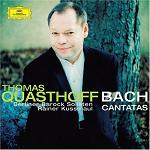It was with his numerous contributions to Helmuth Rilling’s complete Bach cycle for Hänssler that bass-baritone Thomas Quasthoff and his rich, sonorous voice first made an indelible impression. His dynamic, urgent performances of the bass arias of the St. Matthew Passion and the ringing clarity he brought to his role in the B minor Mass are among his more memorable efforts. Since signing exclusively with Deutsche Grammophon Quasthoff has offered four recitals of mostly romantic repertoire that, while equally captivating and beautiful in their own right, made us wonder when this incredibly gifted singer would return to Bach, who arguably had had more of an impact on his career than any other composer. Well, the wait certainly was worth it, and with this new recital of three of Bach’s most inspired cantatas Quasthoff once again demonstrates why he ranks among today’s finest Bach singers.
With its many extended legato passages, the opening aria to Ich will den Kreuzstab gerne tragen (Gladly I bear the cross) BWV 56 affords Quasthoff ample opportunity to display his unique instrument. His seemingly effortless coloratura is stunning–a feat made even more apparent when compared with Dietrich Fischer-Dieskau’s own distinguished performance (also on DG) with Karl Richter. Quasthoff’s radiant, more seamless delivery imbues the aria with a greater sense of devotion that complements rather than opposes the otherwise pervasive seriousness of the text. The Berlin Baroque Soloists’ slightly swifter tempos also reinforce Quasthoff’s vision, which clearly focuses on the promise rather than the resignation implicit in both the text and Bach’s sublime music.
Ich habe genug (It is enough) BWV 82 is one of Bach’s most famous cantatas, and while it has received many excellent recordings over the years, Quasthoff’s lucid, joyous rendering is the finest among them. No, I haven’t forgotten about Lorraine Hunt Lieberson’s otherwise excellent Nonesuch account that received plenty of attention last year, though the solemn pall cast throughout her performance offers solace but precious little hope. Quasthoff’s more convincingly redemptive interpretation goes further, exploring more fully the range of psychological and emotional nuance. Indeed, Quasthoff’s ravishing performance of the well-known central aria “Schlummert ein, ihr matten Augen” (Slumber now, weary eyes) places his interpretation firmly in the league of former greats such as Hans Hotter (EMI), Fischer-Dieskau, and Jacob Staempfli (Accord).
Deutsche Grammophon’s sound is quite good, with excellent balances between soloist, orchestra, and chorus. Jurgen Otten’s erudite notes are a fitting testament to Quasthoff’s artistry and mission (we learn for example that Quasthoff likens the grandeur of Bach’s music to that of a cathedral, and that his principal concern is to convey the “Christian message” of these cantatas). All in all this is a remarkable achievement that couldn’t be more highly recommended. [12/15/2004]
































